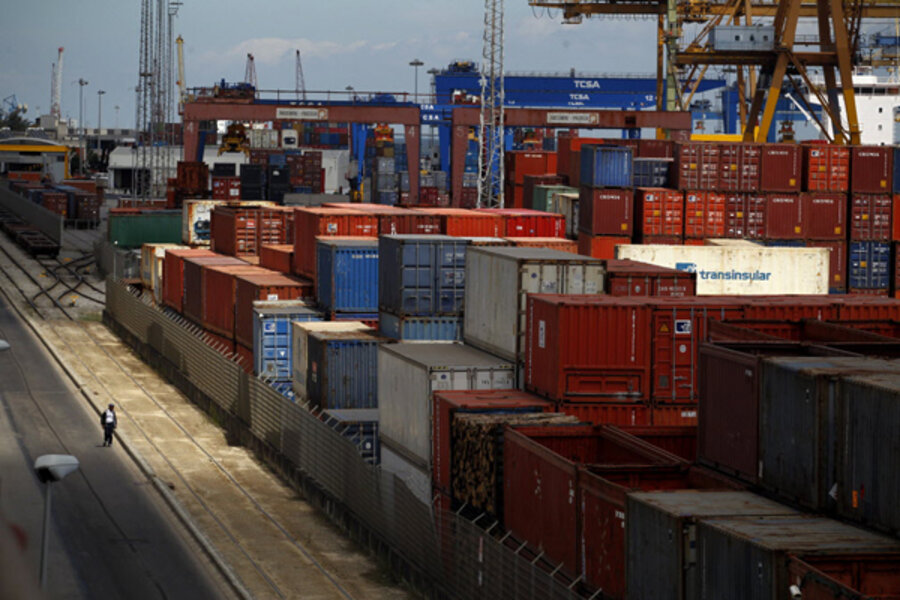Retailers prepare for possible ports strike next month
Loading...
| Newark, N.J.
A union representing dock workers at the East Coast's busiest port has authorized a strike if a contract deal isn't reached by the end of next month, lending urgency to preparations by retailers to send cargo elsewhere if labor talks affecting the entire seaboard remain at a standstill.
The negotiations affect ports up and down the East Coast and turn on key issues of overtime rules and container royalties, which are payments to union workers based on the weight of cargo received at each port. Talks broke down last week, and both sides said Wednesday no new discussions had been scheduled.
Some retailers had already put contingency plans into action and were rerouting ships to the West Coast or seeking other alternatives, while others were on the verge of acting, according to Jonathan Gold, vice president of supply chain and customs policy for the National Retail Federation.
"Some already have decided to move cargo to the West Coast or to bring it earlier to the East Coast," Gold said. "From what most folks have told me, they're going to decide in the next week whether they're going to pull the trigger."
The Port of Los Angeles was prepared for the additional traffic, spokesman Phillip Sanfield said. Any rerouted ships likely won't arrive for a few weeks, he said.
A spokesman for Local 1804-1 of the International Longshoremen's Association confirmed the union's strike authorization vote was entered late Tuesday. The local represents about 1,200 of the Port of New York and Jersey's 3,500 longshoremen and consists of maintenance and repair workers, spokesman James McNamara said.
The local was supposed to have negotiations this week, but those were canceled, he said.
In 2011, the New York-New Jersey ports handled cargo valued at $208 billion, up 18 percent over 2010, according to the Port Authority of New York and New Jersey.
James Capo, head of the U.S. Maritime Alliance, which represents container carriers and port operators in the negotiations, has accused the union of taking advantage of loose overtime rules to make the New York-New Jersey ports the most expensive in the world. The alliance claims one-third of ILA workers there make more than $200,000 per year, not counting bonuses.
Those bonuses include container royalties that were negotiated in the 1960s to protect workers from job losses due to automation but now serve as a guaranteed payment of more than $15,000 annually for East Coast workers, the alliance contends.
"Over the years, we've got a number of inefficient work rules and practices that have crept into the operation and need to be addressed," Capo said. "It drives our costs up and makes us noncompetitive."
McNamara accused the alliance of cherry-picking numbers and focusing only on a small minority of highly paid employees. He said the container royalties serve a valuable purpose by defraying benefits costs for union members in smaller ports, such as New Orleans and Jacksonville, Fla.
"Up until last Wednesday, we thought we were very close," McNamara said of the negotiations. "Then they came in with a very hardline stance all of a sudden, and that resulted in the two sides as being very far apart."
A port strike could be economically devastating for Georgia, especially at Savannah, the second-busiest container port on the East Coast.
A strike would sideline roughly 1,500 longshoremen in Savannah, where the Georgia Ports Authority employs about 1,000 additional staff. And the economic impacts would ripple outward far from the docks on the Savannah River. A recent study by the University of Georgia said the ports in Savannah and nearby Brunswick directly support 153,884 jobs statewide.
"Right now, with the state of the economy in the United States, we don't need any negative drag on it whatsoever," Curtis Foltz, executive director of the Georgia Ports Authority, told The Atlanta Journal-Constitution. "A work disruption on the East Coast certainly doesn't help our recovery."
Foltz was traveling out of the country Wednesday and unavailable to comment further, Georgia ports spokesman Robert Morris said.
Willie Seymore, president of the Savannah chapter of the longshoremen's union, did not immediately return a call from The Associated Press seeking comment.
Associated Press writer Russ Bynum in Savannah contributed to this report.







